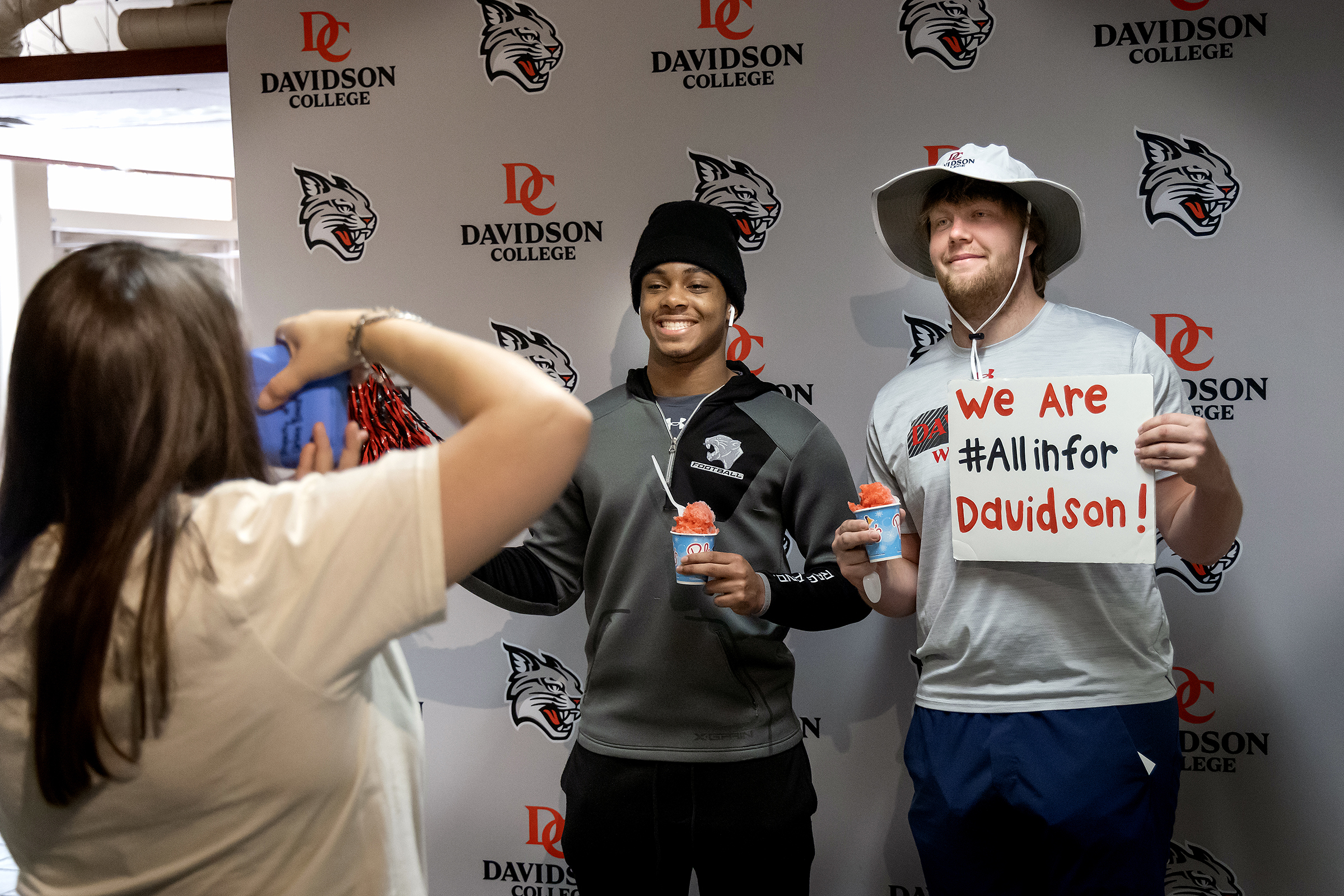Sweating the Small Stuff: Q&A With Three Reporters Navigating Truth With Integrity
March 25, 2019
- Author
- Jay Pfeifer

Julia Ainsley '09, Camila Domonoske '12 and Alexi McCammond
Three rising stars in journalism will talk about the challenges and opportunities facing reporters in an era of ever-increasing speed and deepening polarization at 8 p.m., Wednesday, March 27, in Tyler-Tallman Hall, Sloan Music Center.
Our guests for the panel discussion will be: Julia Ainsley '09, NBC; Camila Domonoske '12, NPR; and Alexi McCammond, Axios. The event is free and open to the public. Reserve tickets online through the Alvarez College Union Ticket Office (a small convenience fee is charged at time of reservation) or pick up for free at the Alvarez College Union Ticket Box Office.
Over email, all three participants shared the behind-the-scenes details of a memorable story they worked on and reflected briefly on objectivity and bias when truth seems ever more negotiable.
Do you hear more about perceived bias from readers/listeners now than you did before 2016?
Julia Ainsley '09, @JuliaEAinsley:
"I certainly think that the Trump administration has brought increased attention on the media and perceived bias. I, for one, think the magnifying glass on the media is somewhat of a blessing. We constantly have to ask the questions: Would we report this about another president? Is there a story we are missing because we are so busy fact-checking the president? Can we say the president lied? And are there any terms we are using that would imply a bias or perceived bias in our reporting?
"I think these are important conversations to have and I hope the media will be strengthened, not diminished, by the end of the Trump administration. Other topics discussed in newsrooms now include staying physically safe in increasingly hostile political reporting environments and deciding how much evidence is needed to run a story the administration claims is false."
Camila Domonoske '12, @camilareads:
"In truth, I'm not sure we hear more about perceived bias now. What sticks out to me is that people seem even more appreciative of NPR's commitment to balanced coverage. Even when people are annoyed with us for not framing things in the way they would like, there is often a begrudging respect along with it-partly, perhaps, because of a perception of increased polarization across the media landscape.
"I say this with the caveat that this is a purely subjective answer, and I don't mean to discount the legions of people who consider us either blindly parroting the administration or blindly bashing it at every turn."
Alexi McCammond, @alexi:
"I really try hard to be as objective as possible, and I think I'm succeeding in that. Because of that, I don't get a lot of negative feedback from readers who think I'm biased one way or the other.
"Sometimes, conservative websites will clip something I say and publish it out of context, or they'll latch onto a single adjective (like "ridiculous") and blow that out of proportion. I only respond if it's a really egregious claim. Once, a conservative radio host alleged that I was sexist against conservative women, which is just absurd. So, I corrected him on Twitter for that. It's gotten so bad that someone emailed me recently when I was on with Nicolle Wallace and asked if I speak for Axios when I giggle with her. Apparently, laughing is now perceived as a form of bias, which I guess I can understand but that still felt pretty nitpicky to me.
"The ‘post-truth' era, plus just working at a place like Axios, makes me place such a high premium on objectivity and integrity that it really is the single-greatest guiding force in what I do."
Can you share a story with an unusual origin or unexpected impact?
Ainsley '09
The story:
Only six immigrants in terrorism database stopped by CBP at southern border from October to March(January 7, 2019)
"Reporting this was fast and furious.
"Shortly after White House press secretary Sarah Huckabee Sanders told reporters that 4,000 terrorists were caught crossing the southern border, journalists across Washington got to work fact checking her. She was using the figure to support the need for the president's border wall, the fight for which had left hundreds of thousands of federal workers without pay at the time.
"Sanders later said that not all 4,000 terrorists came across the southern border, but some came across the southern border and others came through airports and seaports.
"That's when I obtained a document from a source that captured the latest statistics Customs and Border Protection had provided to Congress on the topic. It recorded the first half of fiscal year 2018 and found that only six immigrants on the terrorism database were caught crossing the southern border.
"As soon as I had the document in my hands, I called my editor, who immediately realized the gravity of the information. My second call was to a spokesperson at the Department of Homeland Security. I got immediate pushback from DHS. The spokesperson told me I could not report this information because it was law enforcement-sensitive.
"That sparked an important conversation: Should we report on data that could endanger law enforcement professionals? The answer to that, is of course no. I have held back from reporting key details that could endanger people in the past.
"But would this data do that? I spoke to two former high-ranking DHS officials who told me no, reporting simply the number without names, dates and entry points would not endanger law enforcement. We ultimately decided that the government could not hide behind the argument that this information was too sensitive in order to keep the media from reporting the correct number while they themselves repeated an incorrect number without regard to sensitivity.
"The story took off across the web and TV as soon as we published. Two days later, when Trump made a national address on the issue, the terrorism argument was missing from his rhetoric."
Domonoske '12
The story:
When 'Miss' Meant So Much More: How One Woman Fought Alabama - And Won (November 30, 2017)
"I was writing a quick obituary for Sheila Michaels -- the woman who popularized the honorific "Ms." The New York Times had already run an excellent obituary on her, and credited her roommate, Mary Hamilton, as the person who unintentionally inspired her.
"Just a tiny little detail, right? But the thing was, the New York Times called Mary Hamilton "Mari Hamilton" -- an unusual spelling, and one I couldn't find confirmed in other sources. So I was poking around. Intriguingly, I also found out that Mary Hamilton had been the subject of an NPR story about civil rights history... because she fought a Supreme Court case for the right to be called Miss, an honor routinely denied black women in court in the South.
"A fight for Miss and one for Ms.? Seemed like a wild coincidence. I finished my obituary for Sheila and included a section on Mary... but I felt like there was an even bigger story to tell here.
"I spent six months putting together a podcast episode about it. All from a typo in the Times and my quest to make sure I spelled a name right. (Sweat the small stuff, folks.)."
McCammond
The story:
Scoop: Insider leaks Trump's "Executive Time"-filled private schedules (Feb. 3, 2019)
"I kept seeing these incremental stories about schedules and I had some myself, but decided to wait until I had what felt like a critical mass of them to publish.
"It was a really exciting story to report -- both personally and professionally -- and it's the biggest story I've had to date. It went from trying to decide whether to analyze the president's daily meetings and who he was meeting with to simply sharing with the public how his days are structured and the unprecedented amount of Executive Time he has on any given day."



